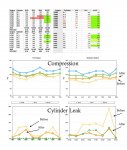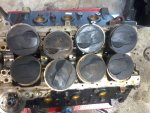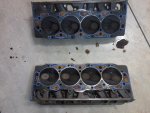- Joined
- Jul 18, 2011
- Messages
- 18,783
My end of season compression and leak test on my Mercruiser 7.4LX MPI engines (2 of them) showed some problems that appeared to be needing a valve job. In the process of doing some research, I came across some information on ‘decarbonization’ that looked like it had some potential for the situation with my engines. I figured that perhaps carbon in the cylinders and valve seats were causing a fair amount of leak. . . . 830 hours on the engines.
Sooo, I did the SeaFoam thing with some results. I ran a 50/50 mix of SeaFoam and gasoline through the engines (32 oz each engine) . . . Then I sprayed SeaFoam into the cylinders via the spark plug holes and then purged the excess, let it sit and ran the engines.
I used a borescope to get a look inside the cylinders and there still seemed to be a fair amount of carbon on the valve faces and the pistons, etc. So, I thought about doing some more decarb'ing. . . Finally, I read about using water as a decarbonizing agent, apparently the conversion of water to steam during the combustion process loosens/dislodges carbon and makes for a clean combustion chamber.
I did a quick compression test after doing the sea foam and it showed some improvement. So, I figured that maybe a water ‘injection’ treatment would provide some additional benefit.
There are a variety of Youtube videos and Internet posts about decarb’ing with water. Big concern was to not ‘spray’ too much water into the engine all at once and cause a hydrolock situation.
Since I have an MPI engine, I could not use the common process used on carburated engines, which is to pour a trickle of water down the carb while the engine is rev’ed to about 2500-3000 RPM. So, I came up with a ‘mist sprayer’ that I could attached to a garden hose.
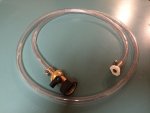
This sprayer created a decent mist of water and I measured the amount of water that it dispensed . . . about 1 Litre / minute.
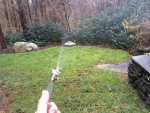
I was curious if this amount of water would cause a problem with the engines, i.e. over pressurize the cylinders during the combustion/vaporization process. So, I did some calculations using the parameters of my Mercruiser engines and the water rate that I had measured.
Doing some Math . . .
I figured on running the water through the engines at 2500 RPM and hopefully the water would slow the engine only down to about 2000 RPM.
From the specs of my engines . . . The displacement of each cylinder is 929 ml, and the cylinder heads have a 118 CC (ml) combustion chamber, to the total volume is 1047 ml.
1 litre per minute is 125 ml for each cylinder per minute. . . . the engine running at 2000 RPM will equate to 1000 combustion cycles each minute. So, each combustion cycle gets about 0.125 ml of water.
The 0.125 ml of water will rapidly turn into steam (water vapor). The density of water vapor is about 0.804 g/l . . . or about 1200 times less dense than liquid water. So, the .125 ml of water would turn into 155 ml of vapor during the combustion cycle.
Comparing the 155 ml versus the 1047 ml of the cylinder (at BDC) did not seem like an excessive amount of extra pressure. So, it looked like for my engines, 1 litre per minute at 2000 RPM would be OK.
I warmed the engines up for about 10 minutes and then set the throttle up to 2500 RPM and applied the water.
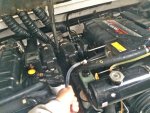
The water would tend to slow down the engine to about 2000 RPM, and as the engine started to bog, I let up on the water until the RPM started to rise. Total time of applying the water was 6-8 minutes at about a 50% duty cycle, so about 3 litres of water into/thru each engine. Lots of steam came out the exhaust while the water was being sprayed.
Then I ran the engines for another 10-15 minutes to make sure things were cleared of water.
* * * Continued on Next Post * * *
Sooo, I did the SeaFoam thing with some results. I ran a 50/50 mix of SeaFoam and gasoline through the engines (32 oz each engine) . . . Then I sprayed SeaFoam into the cylinders via the spark plug holes and then purged the excess, let it sit and ran the engines.
I used a borescope to get a look inside the cylinders and there still seemed to be a fair amount of carbon on the valve faces and the pistons, etc. So, I thought about doing some more decarb'ing. . . Finally, I read about using water as a decarbonizing agent, apparently the conversion of water to steam during the combustion process loosens/dislodges carbon and makes for a clean combustion chamber.
I did a quick compression test after doing the sea foam and it showed some improvement. So, I figured that maybe a water ‘injection’ treatment would provide some additional benefit.
There are a variety of Youtube videos and Internet posts about decarb’ing with water. Big concern was to not ‘spray’ too much water into the engine all at once and cause a hydrolock situation.
Since I have an MPI engine, I could not use the common process used on carburated engines, which is to pour a trickle of water down the carb while the engine is rev’ed to about 2500-3000 RPM. So, I came up with a ‘mist sprayer’ that I could attached to a garden hose.

This sprayer created a decent mist of water and I measured the amount of water that it dispensed . . . about 1 Litre / minute.

I was curious if this amount of water would cause a problem with the engines, i.e. over pressurize the cylinders during the combustion/vaporization process. So, I did some calculations using the parameters of my Mercruiser engines and the water rate that I had measured.
Doing some Math . . .
I figured on running the water through the engines at 2500 RPM and hopefully the water would slow the engine only down to about 2000 RPM.
From the specs of my engines . . . The displacement of each cylinder is 929 ml, and the cylinder heads have a 118 CC (ml) combustion chamber, to the total volume is 1047 ml.
1 litre per minute is 125 ml for each cylinder per minute. . . . the engine running at 2000 RPM will equate to 1000 combustion cycles each minute. So, each combustion cycle gets about 0.125 ml of water.
The 0.125 ml of water will rapidly turn into steam (water vapor). The density of water vapor is about 0.804 g/l . . . or about 1200 times less dense than liquid water. So, the .125 ml of water would turn into 155 ml of vapor during the combustion cycle.
Comparing the 155 ml versus the 1047 ml of the cylinder (at BDC) did not seem like an excessive amount of extra pressure. So, it looked like for my engines, 1 litre per minute at 2000 RPM would be OK.
I warmed the engines up for about 10 minutes and then set the throttle up to 2500 RPM and applied the water.

The water would tend to slow down the engine to about 2000 RPM, and as the engine started to bog, I let up on the water until the RPM started to rise. Total time of applying the water was 6-8 minutes at about a 50% duty cycle, so about 3 litres of water into/thru each engine. Lots of steam came out the exhaust while the water was being sprayed.
Then I ran the engines for another 10-15 minutes to make sure things were cleared of water.
* * * Continued on Next Post * * *
Last edited:




















